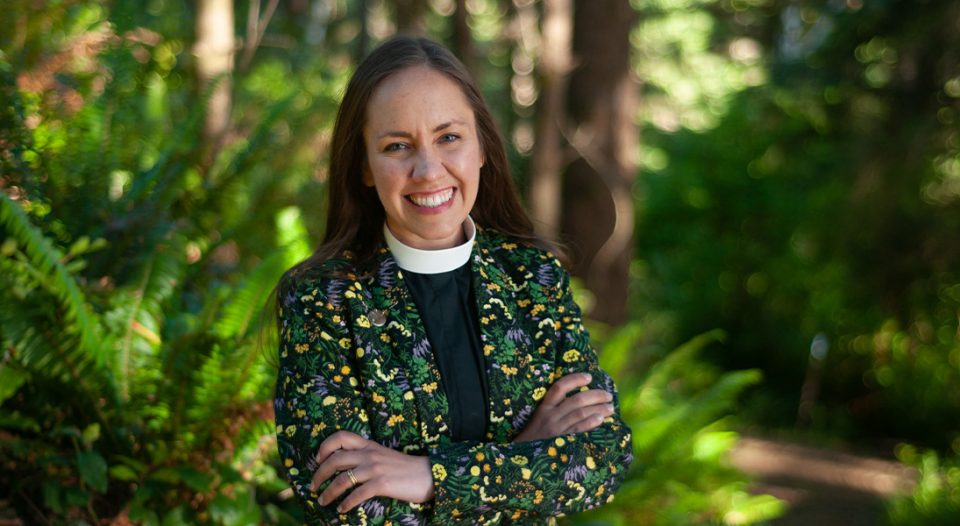Gloria Dei Lutheran Church, Coos Bay, Ore.
ELCA deacon and legal ministry attorney
I’m called by the Oregon Synod to serve the southern Oregon coast in a specialized ministry of poverty alleviation and faith formation. St. Timothy Episcopal Church in Brookings hosts my ministry, both as a fiscal sponsor and physically giving me the office space and the invitation to serve people experiencing housing insecurity here.
I’m the only civil legal aid attorney in my county, the only female attorney in my county, the only young adult attorney in my county—and also the only Lutheran minister. No matter what context I’m in, there’s an opportunity to explain what that means to someone. Because there isn’t a formal ELCA presence in the community where we live, I think of myself as kind of like a domestic ELCA missionary to this isolated and rural, underserved area.
I’ve felt a call to ministry since I was a young child. But I had a clear understanding that it was not a call to be a pastor or to pastor a congregation. The best language I had for it, before I learned about the Word and Service roster, was a particularly strong sense of a vocational or baptismal call. And that’s what I felt like my sense of call was for, and for this community.
In a previous position I had, when I lived in San Francisco after law school, we were handling a really high level of cases, 3,000 cases a year, for people who were on the day of losing their homes, through an eviction public defense project. It quickly became apparent that the job was maybe 25% lawyering legal work and 75% ushering people through one of the hardest days of their lives—making sense of it, finding hope, building purpose, connecting to resources and learning that they weren’t alone and that this wasn’t a personal failing.
I saw my role as kind of a midwife, holding hands and guiding people through a process that was very real and very scary, without any promise of what the result would be. The result was mostly out of our hands. But clients would often just grab my hand and start praying. They would initiate it, and I found myself in prayer with our clients quite a bit. That experience helped me see that, while my work, my sense of stewardship of my education and my privilege in life have led me to always want to serve the public, this is ministry—person to person, providing hope, grace and solidarity with people.
It was around that same time, in 2014 or 2015, that I started to hear about deaconesses. I got interested in learning more about what that type of ministry even was, because I had never met a deaconess or a diaconal minister before. The second that I learned about the Deaconess Community of the ELCA, it felt like someone had put glasses on me for the first time, and everything seemed to fall into place: “Oh, diaconal ministry, this is what my calling is.” And all of those pieces of my life made sense. It was a really powerful, interesting moment.
The second I learned about the Deaconess Community, it felt like someone put glasses on me for the first time, and everything seemed to fall into place.
I happened to be an adult leader at the Youth Gathering in 2018, kind of by accident, because the regular youth leader had had a family emergency and couldn’t accompany the children. So I took a week off of work and ended up on a plane. The theme was “This Changes Everything,” and there was all this talk about how it was going to change your life. I remember leaving, telling my husband, “I hope it’s a life-changing experience for the children,” never thinking that it would change my life.
It was there that I was walking around the big hall of activities and found a seminary miniature golf course. There was a Golden Gate Bridge hole, and that was the Pacific Lutheran Theological Seminary hole. I met the director of admissions and asked, “So, here’s what I’m doing—do you think this could be ministry?” And she said, “Oh my goodness, this is 100% ministry. The way you articulate this is so clearly what diaconal ministry is about. I’m going to get you in touch with the vocational director for the Deaconess Community.” I made a phone call and had an application in by the end of the week.
There was a person on the return flight who was a pastor on the Sierra Pacific Synod candidacy committee. And, like a good candidacy committee member, he happened to have the entire candidacy manual just casually in his briefcase and handed it to me. That was my easy plane reading on the way back to California. By the end of it, I had a good sense of what the process and what the expectations were. I applied to Pacific Lutheran by the end of the month and started that next term.
I had a really strong sense of call and knew what the work would be. That helped quite a bit in articulating what specialization I would have and what courses would be helpful for developing a set of competencies. I made an individual education plan with the seminary to have a clear goal of where we were trying to get to.
Pacific Lutheran Seminary and the Sierra Pacific Synod were able to catch the vision quickly. They were incredibly helpful in making sure that I didn’t have unnecessary additional cost to our household, given that I was still paying off a massive debt from law school. We were identifying, what competencies could I improve through portfolio work or through meeting with a supervisor or mentor? What experiences had I already developed that would satisfy a competency? And, through a generous scholarship from Lord of Life Lutheran in [The Woodlands,] Texas, I was able to receive a full year of tuition.
The sense of vocational call that I felt as a teenager was what led me down the educational path and the service careers I was in. I was sustained, energized and informed by my faith. There hasn’t ever been a sense of “This is my church volunteer work, and this is my legal work.” For example, when I lived in San Francisco, before I was in seminary, I volunteered with the AMMPARO program and Guardian Angels. I provided technical assistance to a congregation on how to create and handle safety planning to prevent an Immigration and Customs Enforcement raid if they were engaged in hosting a family. That was where the merger of my faith and the legal world started.
There hasn’t ever been a sense of “This is my church volunteer work, and this is my legal work.”
During a typical week I do direct client services in the morning and mostly issue and advocacy work in the afternoon. St. Timothy’s is open to those seeking respite Monday, Wednesday and Friday mornings from 9 to 12. That’s also when I host one-on-one consultations with anyone on a drop-in basis, primarily serving people who are living in a vehicle or a tent outside. I don’t charge any legal consultation fees. I’m working with folks on their issues, oftentimes trying to get an ID or a driver’s license or trying to figure out where it’s legal for someone to park to spend the night.
I also help people, particularly those who have come through the 12-step recovery community, with expungements. A lot of people have possession of controlled substance convictions or arrests on their record that are preventing them from moving forward with their employment and housing goals.
The issue and policy work I do in the afternoons includes assisting our regional housing authority, which administers Housing and Urban Development benefits, on identifying opportunities to increase the usage of Section 8 vouchers in our community. I’m also on the board for a nonprofit that’s looking to create the first emergency shelter in a tiny-home village for a community just south of us and providing some technical assistance with that.
I worked on a piece of legislation for the state of Oregon that just passed that would allow people who don’t have access to a kitchen facility to be able to use their food stamps to buy food that’s been already prepped. And in addition to monitoring our local court systems and monitoring those cases, I’m seeking to ensure that our municipalities and our county are abiding by our Ninth Circuit rulings about people’s rights to sleep outside if they have no place else to go, because we don’t have any emergency shelter in the whole county.
It’s important to me that I’m a member of the Deaconess Community and have both accountability and support through that community. I’m in an isolated area and, particularly for anyone who’s ministering on the margins or doing innovative forms of ministry, having a community behind you, both for moral support and institutional support, emboldens you.
In the Deaconess Community we say that we are emboldened by our history, and it’s been really true. It’s not just a little thing. It emboldens me to know that we had these fearless, gospel-driven women in our early church history about 150 years ago who were coming to the United States and essentially invented social work. They were working in inner cities in tenements, trying to find adequate clothing and food for new arrivals and for people who were not making ends meet. I see my ministry as an extension of that, just in a different context—in 2024, in a rural area of Oregon.
I’m a Lutheran because I’ve been convicted that we’re free in Christ to love and serve our neighbor. The Lutheran tradition, and especially its wonderful tradition of theology, empowers me to be able to live out my faith in my vocation and daily life.
If you’d like to nominate someone for “I’m a Lutheran,” email livinglutheran@elca.org.






